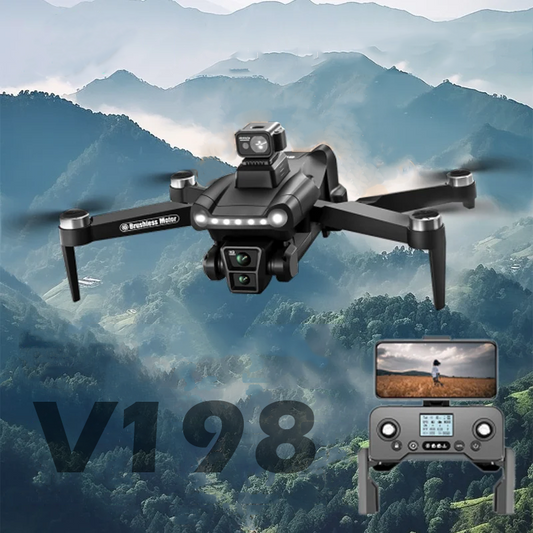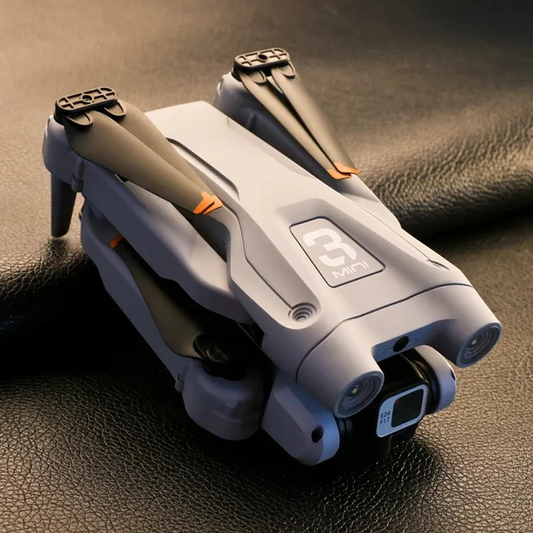The Role of Drones in Scientific Research

In the dynamic landscape of scientific research, technology is rapidly reshaping the way we explore, study, and understand the world around us. One such revolutionary advancement that has soared to prominence in recent years is the use of drones. These unmanned aerial vehicles (UAVs) have transcended their initial military applications and are now playing a pivotal role in various scientific disciplines. In this article, we will delve into the multifaceted role of drones in scientific research, exploring how these airborne marvels are transforming the way we gather data, conduct experiments, and make groundbreaking discoveries.
1.Precision Aerial Surveillance:

Drones, equipped with state-of-the-art cameras and sensors, have become indispensable tools for scientists seeking unparalleled precision in aerial surveillance. In ecological research, for instance, drones allow researchers to monitor and study wildlife populations in their natural habitats without causing disturbance. This non-intrusive approach provides valuable insights into animal behaviour, migration patterns, and even helps in conservation efforts by tracking endangered species.
In the field of geology, drones are instrumental in mapping terrains with a level of detail and accuracy that was previously unattainable. High-resolution imaging and 3D mapping capabilities enable geologists to analyse landscapes, identify geological formations, and monitor changes over time. This not only expedites research processes but also aids in early detection of natural disasters such as landslides or volcanic activity.
2.Efficient Data Collection:
Traditionally, collecting data in remote or challenging terrains has been a cumbersome task for scientists. Drones, however, have revolutionised this process by offering a cost-effective and efficient means of data collection. In oceanography, for example, drones equipped with sensors can be deployed to collect data on sea temperature, salinity levels, and marine life. This real-time information is invaluable for understanding ocean ecosystems and predicting climate changes.
Moreover, drones are transforming agricultural research by providing farmers and scientists with detailed insights into crop health, soil conditions, and irrigation needs. Equipped with multispectral cameras, drones can capture data that is invisible to the human eye, such as variations in plant health and nutrient levels. This allows for targeted interventions, optimising crop yield and reducing the need for excessive pesticide or fertiliser use.
3.Monitoring and Responding to Natural Disasters:

The swift and agile nature of drones makes them indispensable in monitoring and responding to natural disasters. In the aftermath of earthquakes, hurricanes, or wildfires, drones equipped with thermal cameras and gas sensors can be deployed to assess damage, locate survivors, and identify potential hazards. This not only expedites the response time of rescue teams but also minimises the risk to human life in hazardous environments.
Drones have proven particularly effective in tracking the progression of wildfires. By providing real-time aerial footage, they enable firefighting teams to strategize and allocate resources more efficiently. Additionally, thermal imaging allows for the identification of hidden hotspots, preventing the re-ignition of fires after they have been seemingly extinguished.
4.Advancements in Archaeological Exploration:

Archaeologists are leveraging the capabilities of drones to revolutionise the way they explore and document historical sites. Aerial photography and 3D mapping enable researchers to create detailed digital models of archaeological sites, enhancing the accuracy of documentation and preservation efforts. Drones have been instrumental in discovering previously unknown sites, uncovering hidden structures, and even assisting in the reconstruction of ancient landscapes.
In remote or inaccessible areas, such as dense jungles or mountainous terrains, drones provide archaeologists with unprecedented access. This has the potential to reshape our understanding of ancient civilizations by uncovering artefacts and structures that were previously beyond reach. The speed and efficiency of drone-assisted archaeological surveys also contribute to the preservation of delicate sites by minimising physical impact.
5.Wildlife Conservation and Anti-Poaching Efforts:

Drones are emerging as powerful tools in the ongoing battle against wildlife poaching. Equipped with thermal imaging and GPS tracking, they can monitor large expanses of protected areas, detect illegal activities, and provide real-time data to law enforcement agencies. This not only helps in preventing poaching incidents but also contributes to the overall conservation of endangered species.
Beyond surveillance, drones are actively involved in wildlife research and monitoring. Researchers can use drones to track animal migrations, study nesting behaviours, and even collect biological samples without disturbing the natural habitat. This non-invasive approach ensures that the study of wildlife does not pose a threat to the very species scientists aim to protect.
As we navigate the frontiers of scientific discovery, drones have emerged as indispensable companions, facilitating research across diverse disciplines. From precision aerial surveillance to efficient data collection, and from monitoring natural disasters to revolutionising archaeological exploration, the impact of drones in scientific research is nothing short of transformative.
As technology continues to evolve, it is certain that drones will play an increasingly crucial role in expanding the horizons of scientific exploration. The ability to access remote or hazardous environments, gather accurate data, and respond swiftly to emerging challenges positions drones as essential tools for the scientists of today and tomorrow. As we look ahead, the skies are not just a canvas for innovation but a realm where the future of scientific research is taking flight.
Explore a variety of drones at our online drone store.
Happy Flying!









